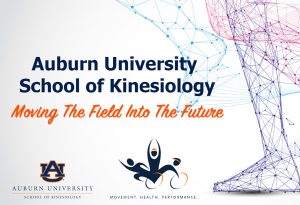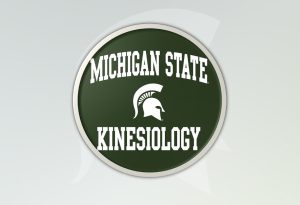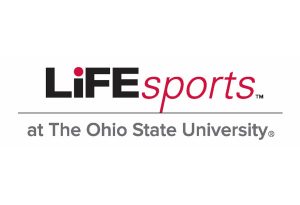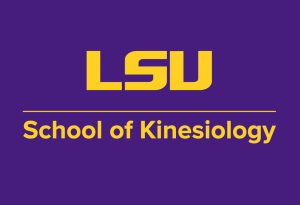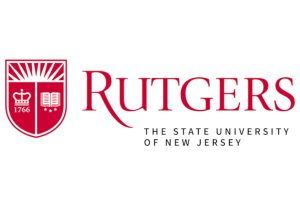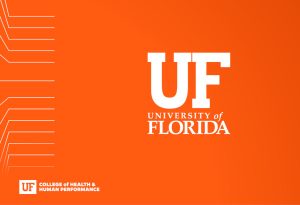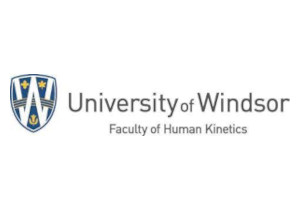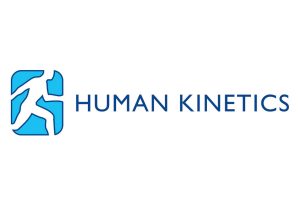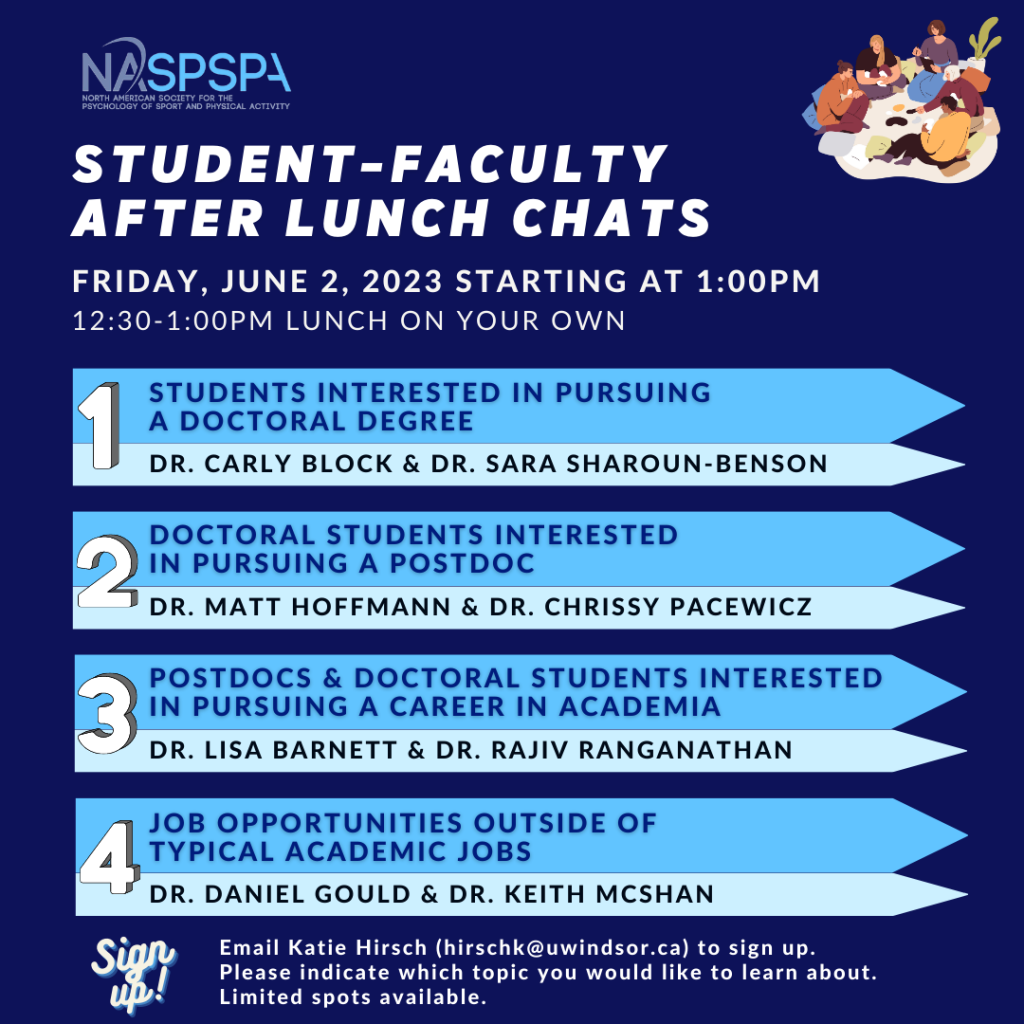Information about future conference sites is available here.
Parties interested in sponsoring the conference or exhibiting can contact naspspaed@gmail.com.
Click HERE to access the archives for NASPSPA emails (including previous emails about the conference).
To receive our NASPSPA email communications, subscribe, here.
2023 Conference
Toronto, Ontario Canada
June 1 – June 3
Abstracts open December 1 and close January 30
Thank you to our NASPSPA 2023 Conference Sponsors
Dear NASPSPA Community,
The abstract submission portal for the 2023 NASPSPA. Conference opens December 1st and will remain open through Monday, January 30. Please visit our 2023 NASPSPA Conference page and our Submit an Abstract page for the details. Information about submitting a conference abstract is below. This information, along with step-by-step instructions can be downloaded in Word format here.
Conference Abstract Submission Information
- Membership:You must be a current NASPSPA member to submit your abstract. The abstract submission process requires you to login with your active membership credentials to start the process. NASPSPA memberships run on the calendar year and renewals that are made after October 1 are automatically credited for the subsequent calendar year. You can update your membership here.
- Authorship: An individual may be the first author on no more than two submitted abstracts (inclusive of verbal and poster presentations) each year. Additional information regarding Ethical Guidelines and the use of Non-Discriminatory Content is available in Section 2C “Guidelines for abstract submission and presentations” in the NASPSPA Policy Manual.
- Presentation types: Verbal and poster presentations and symposia will be accepted. Detailed information about presentation format will be forthcoming, but generally speaking, verbal presentations will be 12 minutes with 3 minutes for questions, and posters will be physical (paper, or similar) posters displayed on poster boards in a conference meeting room. Symposia are a collection of verbal presentations that are submitted together as a single submission. You have the option of indicating your preference for a verbal or poster presentation when you submit your abstract, as well as to indicate if you are only willing to accept a presentation of a certain type. The same scientific and formatting content rules apply when preparing abstracts for verbal or poster presentations.
- Scientific content: Data-based, theoretical, or research review papers that have not been previously published in an archival scientific publication or presented elsewhere at a national or international conference are eligible for submission.
- Formatting content:
- Length: All abstracts (regardless of whether you are submitting for a verbal or poster presentation) have a maximum length of 2100 characters (including spaces). To check the number of characters in your draft in Word, select your abstract text (do not include any title or author information), click on the “Review” tab in the header, then select “Word Count”. This will give you a pop-up window with the statistics of your highlighted text. Focus on the “Characters (with spaces)” line to ensure you have less than 2100.
- Body: The abstract body should notinclude section headings (i.e., Introduction, Methods, etc.), the title, or author information.
- Title: Only the first letter, first letter after a colon or sentence-ending punctuation, and acronyms/names should be capitalized in the title.
- Example: Click herefor an example of an appropriately formatted abstract.
- Where/how to submit: To submit your abstract, click on the red button
- Troubleshooting:If you have issues submitting your abstract, please contact our webmaster (Joel Barnes) at j@barnzilla.ca.
NEW THIS YEAR: This year we will be issuing a call for late-breaking abstracts from undergraduate students on February 15, 2023, with a submission deadline of March 15. This call will be only for submissions where the lead, presenting author is a student (or students) currently registered in an undergraduate program at the time of submission. Late-breaking abstracts will only be accepted for poster presentations. Accepted late-breaking abstracts will NOT have a published abstract associated with them. Smaller scale studies, research in progress, and research proposals by undergraduate students will be eligible for acceptance as a late-breaking abstract. Undergraduate students who wish to submit a late-breaking abstract and attend the conference do have to be a NASPSPA member.
The intention of this late-breaking abstract call is to provide an opportunity for undergraduate students who would like to learn more about NASPSPA, meet potential future graduate supervisors, network with NASPSPA members, and present research work they are involved in. There will be an opportunity for undergraduate students with late-breaking abstracts to register for the conference for a single day at a reduced fee, which will be Friday, June 2 when all of the late-breaking abstract posters will be presented.
PLEASE NOTE: Every year we have several undergraduate students who submit research as part of the regular abstract submission process, and who come to the full conference and present their work either in verbal or poster format. We continue to welcome our undergraduate student members participating in the full conference in this way. This late-breaking abstract opportunity is NOT intended to replace that form of undergraduate student participation, but rather to add a new opportunity for undergraduate students for whom having a completed study ready in time for the regular abstract deadline in January is too soon, and/or attending the full conference is too much, but who would like to check NASPSPA out. We recognize that this opportunity will likely be most attractive to undergraduate students who live near the conference location, as the travel and accommodation costs may make single day attendance less attractive to undergraduates traveling a long way. But we are piloting this initiative this year, and if it becomes part of the program in future years, it will have the potential to benefit students in various geographic areas. More information will be forthcoming in February.
Registration is limited to 50 persons per workshop.
Registration fees:
- Professional and Retirees $50
- Students and Post Docs $25
- Those not attending the conference $100
Workshop 1 (pre conference):
Sample Size Planning to Design Informative Studies
Brad McKay, Laura St. Germain, Julia Hussien, Mike Carter, Mariane Bacelar, and Keith Lohse
Wednesday May 31 – 5 to 8 pm
To register after May 11, 2023, email Penny McCullagh (naspspaed@gmail.com).
The purpose of this workshop is to provide an overview of the key concepts and techniques involved in sample size planning, including how to determine the appropriate sample size for a given study, and how to interpret the results of sample size calculations. Kinesiology
research has been critiqued for overly optimistic inferences, arbitrary use of effect sizes, and a lack of sample size estimation. This workshop will provide an opportunity for our research community to discuss how we can best determine the smallest effect size of interest that may help researchers calculate sample sizes in their research. This workshop will provide a
practical, hands-on introduction to the principles of sample size planning, and will be of interest to NASPSPA members who want to expand their statistical toolbox and improve the quality and reliability of their research.
Workshop 2 (pre conference):
Advancing Partnerships in Youth Sport
Majidullah Shaikh, Heather Gainforth, and Karl Erickson
Wednesday May 31- 5 to 8 pm
To register after May 11, 2023, email Penny McCullagh (naspspaed@gmail.com).
The objectives of this workshop are (1) to bring attendees together in a structured social learning space to discuss the nature of partnerships in sport; (2) for attendees to share their stories of conducting partnerships in sport, and (3) to co-generate next steps in partnership research in sport. This workshop is aimed at students and professionals who are interested in, have experience in, or are currently conducting research partnerships in sport. The workshop will include (1) what we know and what we don’t yet know about research partnerships in sport; (2) a knowledge sharing exercise where attendees will share and learn from others’ experiences of sport partnership, and (3) a discussion of co-development, where attendees will critically explore the state of research partnerships in sport, the gaps or areas of improvement, and co-develop next steps for advancing research and practice of sport partnerships.
Workshop 3 (post conference):
Psychology of High Quality Coaching: Translating Research into Practice
David Anderson and Harjiv Singh, joined by 3 moderators and 12 panelists (researchers and practitioners) access the workshop outline, here.
Sunday June 4 -10 to 3 pm with break for lunch.
Seats are still available in this workshop (as of May 11, 2023), register here!
The purpose of this workshop to familiarize NASPSPA members with current efforts to translate research in motor behavior and sport psychology into practice in high-quality coaching settings. The workshop will bring together experienced coaches/practitioners and high-profile researchers in motor behavior and sport and exercise psychology to discuss how best to translate cutting-edge research into practice. The workshop will involve panel discussions with researchers and practitioners including opportunities for questions, discussion, and critical thinking on three topics: (1) youth sports, positive youth development, talent identification and development, (2) innovative practice, and (3) building team cohesion. This workshop is open to both NASPSPA members, and coaches/practitioners. We are offering a registration option for coaches/practitioners (see below) who are attending this workshop but are not attending the full NASPSPA conference.
Embedded EDI Workshop at #NASPSPA2023
Friday June 2, 1:00-2:00PM EST
There will be a workshop on Intersectionality and Allyship in the Academy hosted by NASPSPA’s Equity, Diversity, and Inclusion Task Force and NASPSPA’s Teaching & Learning Network that will include an online component prior to the conference, and an in-person component embedded into the regular conference program.
The purpose of this workshop is to familiarize attendees with navigating the complexities of supporting people at the intersection of their many identities, and review and discuss challenges and opportunities associated with advancing our understanding of intersectionality and allyship in academia. This workshop is aimed at NASPSPA members at varying stages in their understanding of equity, diversity, and inclusion and will include foundational education as well as discussion of actions that can be taken in the context of NASPSPA and in work at our various institutions.
Part 1 (online, prior to the conference, 60 min May 24, 2023 from 3:00-4:00PM EST) will include a review of concepts, discuss EDI from a diverse lens, share examples of existing barriers and initiative in academic institutions, and a discussion on what intersectional approaches look like in academia. Register for FREE for Part 1, here.
Part 2 (embedded in the conference program) will include facilitated activities and discussions on topics such as how intersectionality shapes one’s experiences in academia, recognizing “green flags” that indicate support of intersectional approaches, what authentic allyship looks like, and how to advocate for other and use positions of power to be an ally.
Note that there is no fee for this workshop and that members are free to attend Part 1 and/or Part 2.
Register for the conference here.
You must be a current NASPSPA member to register!
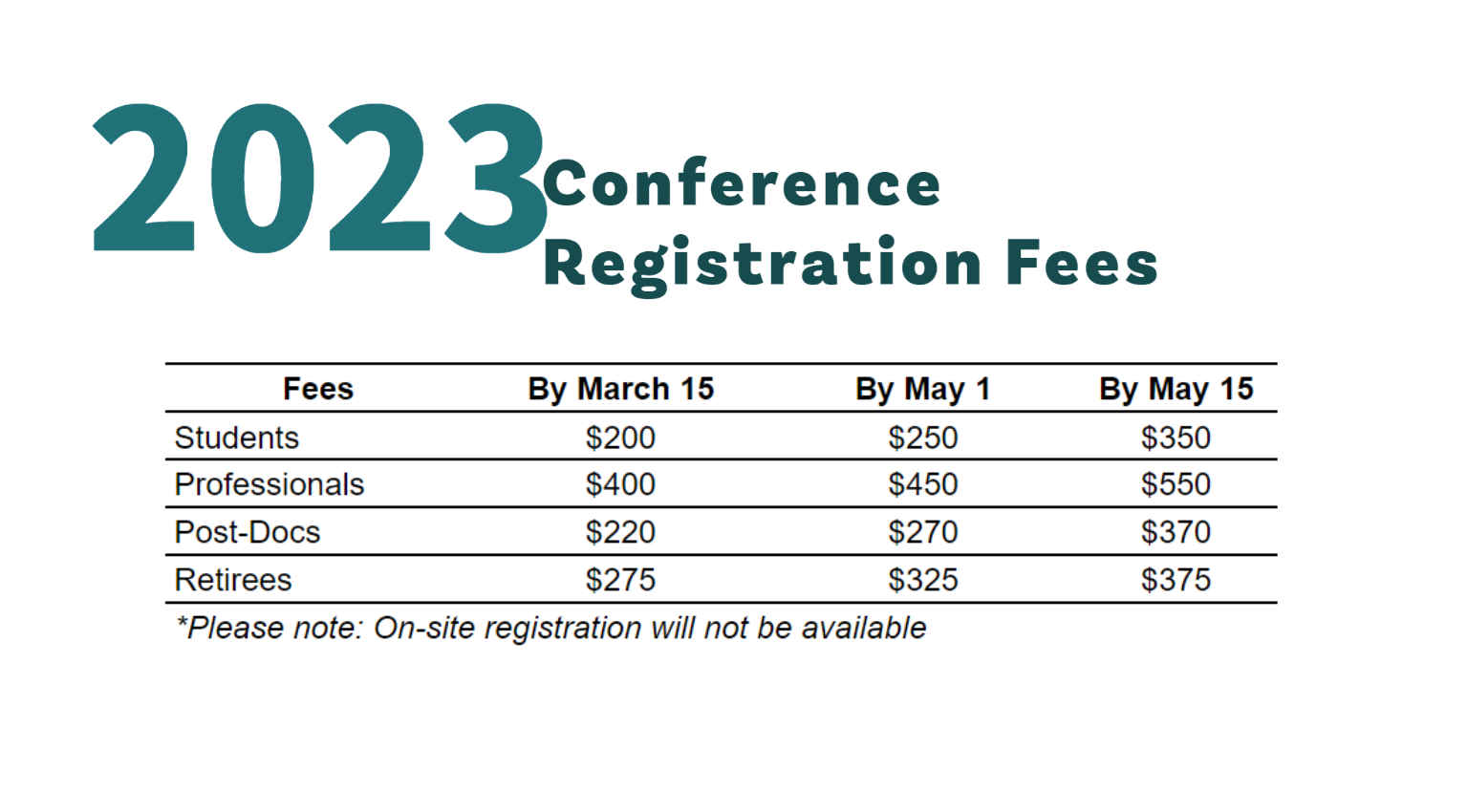
NASPSPA will be held at the Hilton on Richmond in downtown Toronto. Please book using this link to get the conference rate.
As of March 23, we have a few more rooms open at the hotel. Once they are booked we have NO MORE ROOMS.
(Note – public transportation in Toronto is very good)
If you are having any trouble with hotel reservations, contact naspspaed@gmail.com.
We highly encourage you to stay at the hotel since they are providing us with wonderful meeting room space and we contract with the hotel to fill a certain block of rooms. If we do not meet out quota, we need to pay additional fees to the hotel. Thanks for supporting NASPSPA.
Conference room rates:
- $290 Canadian for single, double, triple rooms
- $330 for quad room
Internet is included in the room fee.
These rates are considerably less than you would find on your own to stay at the hotel.
Students looking for a roommate can post in the Conference Roommate Finder. If you have questions, you may contact the Student Representative, Katie Hirsch.
Fly into Buffalo and rent a car or take a shuttle
Join a Lunch Chat at NASPSPA 2023 to network and learn from NASPSPA professional members
NASPSPA Student Connection Resource
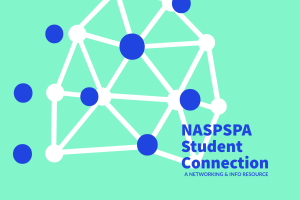 To stay updated on all things student-related, view our Student Connection Platform. We recommend bookmarking it on your internet browser so you can regularly find out what’s new for NASPSPA students.
To stay updated on all things student-related, view our Student Connection Platform. We recommend bookmarking it on your internet browser so you can regularly find out what’s new for NASPSPA students.
Link to more information on the Graduate Student International Travel, Outstanding Student Paper, and Graduate Student Grant awards.
Link to more information on the Student Ambassador Conference Scholarship.
2023 Grid
2023 Program
If you have an oral presentation:
- You will have 12 minutes to present, 3 min. for questions.
- Choose fonts and colors for your slides that are easily visible at a distance
- Bring your presentation to the conference on a thumb drive, and upload it at the registration desk when you register on Wednesday.
- There will NOT be internet in the rooms where oral presentations are held, so do not expect to be able to access your presentation file online, or run any videos, etc. that require access to the internet during your presentation.
- Prepare and practice so your presentation fits within this time.
If you have a poster presentation:
- We are doing physical posters again this year, so bring a printed poster.
- Poster boards and push pins will be provided.
- Posters can be a maximum of 4 feet wide X 3 feet high
- Choose font and graphics that will be legible from a distance
- We suggest preparing your poster in a manner that is concise and gets the message across. See this video for suggestions for making an engaging, legible poster https://www.youtube.com/watch?v=SYk29tnxASs
Abstracts
- Link to abstracts published in the Journal of Sport and Exercise Psychology
- Late-breaking undergraduate student abstracts
NASPSPA University Sponsorship Letter 2023
NASPSPA Business Sponsorship Letter 2023
NASPSPA Movement Challenge
NASPSPA Movement Challenge Flyer
Abstract submission for late-breaking undergraduate student abstracts for the 2023 NASPSPA Conference opens February 15th and will remain open through March 15 at 11:59PM Pacific Time.
Membership
You must be a current NASPSPA student member in order to submit your abstract. The abstract submission process requires you to login with your active membership credentials to start the process. NASPSPA memberships run on the calendar year and renewals that are made after October 1 are automatically credited for the subsequent calendar year. You can update your membership here.
Conference Attendance
You must register for and attend the conference to present your abstract. There will be an option for students who have late-breaking abstracts accepted to register for only 1 day (Friday, June 2, when the late-breaking abstracts will be presented) for a cost of $50 USD. You will receive information about how to register for that one day option when you receive the notice about whether your abstract is accepted. You are also welcome to attend the full conference if you wish. If you choose to attend the full conference, see the conference website to register: https://www.naspspa.com/2023-annual-conference/ and navigate to “Registration”.
Authorship
The lead, presenting author must be a student (or students) currently registered in an undergraduate program at the time of submission. An individual may be the first author on no more than one late-breaking undergraduate student. There is no limit on the number of abstracts you can co-author as a non-first author.
Presentation types
All accepted late-breaking undergraduate student abstracts will be poster presentations. Detailed information about presentation format will be provided at a later date, but generally, if you are accepted for a poster presentation, you will prepare a standard conference poster that will be posted on a poster board in a conference meeting room, and you will be asked to be available during your assigned poster session to answer questions. Requirements for poster size will be posted on the web at a later date when presentation formats are announced.
Scientific content
Research proposals, reports of work in progress, pilot or preliminary studies, and data-based, theoretical, or research review papers that have not been previously published in an archival scientific publication or presented elsewhere at a national or international conference are eligible for submission.
Additional information regarding Ethical Guidelines and the use of Non-Discriminatory Content is available in Section 2C “Guidelines for abstract submission and presentations” in the NASPSPA Policy Manual.
Formatting content
- Title: Only the first letter, first letter after a colon or sentence-ending punctuation, and acronyms/names should be capitalized. Please be careful to write the title in sentence case.
- Body: The abstract body should NOT include section headings (i.e., Introduction, Methods, etc.), the title, or author information.
- Length: Abstracts have a maximum length of 2100 characters (including spaces). To check the number of characters in your draft in Word, select your abstract text (do not include any title or author information), click on the “Review” tab in the header, the select “Word Count”. This will give you a pop-up window with the statistics of your highlighted text. Focus on the “Characters (with spaces)” line to ensure you are less than 2100. See below for an example of an appropriately formatted abstract:
How do I look? The impact of body awareness and self-objectification on motor performance in women
Elizabeth Cox, April Karlinsky, Joseph Manzone, Timothy N. Welsh, Catherine M. Sabiston, University of Toronto
Drawing on tenets of self-objectification theory, women and girls internalize a focus on their body’s appearance rather than its functional attributes. Although self-objectification promotes constrained and ineffective motor performance in girls, it is unknown how body awareness and self-objectification impact motor performance in women. The present study examined the impact of body awareness and self-objectification on performance in women. It was hypothesized that greater body awareness would predict reduced performance during a visual-motor aiming task, and this relation would be mediated by self-objectification. Women (N = 80, Mage = 20.6 ± 3.1 years) completed the state Self-Objectification Questionnaire. To prime awareness of the body, participants were assigned athletic clothing to wear for the duration of the study, had their picture taken, weight, height, and waist circumference measured, and completed a body size distortion task. Participants then completed a visual-motor aiming task while sitting beside a full-length mirror. Their behavior was video recorded. For each participant, number of clothing adjustments and self-views in the mirror were coded and summed, and mean body distortion score was calculated. Z-scores were calculated and summed to create a composite body awareness measure (CBA). Mean and standard deviation (SD) of reaction time (RT) were calculated across aiming task trials. Based on the linear regression models, CBA was significantly related to SD of RT (β = 0.006, CI: 0.002, 0.010, p = 0.002), whereby increased CBA predicted increased SD of RT. The indirect effect of self-objectification was β = -0.001, CI: -0.002, 0.000, p = 0.054. These results suggest women’s body awareness and perception of their body as an object rather than as an effective instrument may lead to inefficient motor performance. Over time, this relatively inefficient performance could deter participation in physical activity. More work is needed to explore this possible link between body awareness, motor performance and physical activity. Funding: SSHRC, NSERC.
Please note: Late-breaking abstracts will NOT have a published abstract associated with them. There will be an opportunity for undergraduate students with late-breaking abstracts to register for the conference for a single day at a reduced fee, which will be Friday, June 2 when all of the late-breaking abstract posters will be presented.
Where/how to submit
See the link below to access the form to submit your abstract. On that form you will be asked for the following:
General Information
- You will be asked to affirm that you are currently enrolled as an undergraduate student
- You will be asked to affirm that you will present at the conference if your abstract is accepted.
- You will be asked to adhere to the ethical guidelines of NASPSPA and APA.
- You must certify that the research you are submitting for presentation has not been published or presented at any other peer-reviewed venue.
Abstract Information – Title, Topics
- Select a research topic from the list presented. (Sport and exercise psychology, motor development, or motor learning and control)
- Enter the Title of the abstract.
- Enter keywords relevant to the abstract.
- Enter the funding source for your research (if applicable).
Author Information
- Enter first (presenting) author’s name, email, and university. Only enter your primary university’s name (no Department/School/Center information is needed).
- If there are multiple authors, please add authors as needed.
- Click on “Step 4: Abstract Content ” to proceed.
Abstract Content
- Copy/paste the abstract text into the box. The abstract total length must be no more than 2100 characters (including spaces).
- After completing Step 4, click the “Save” button to submit your abstract.

